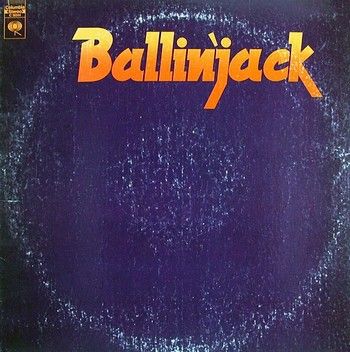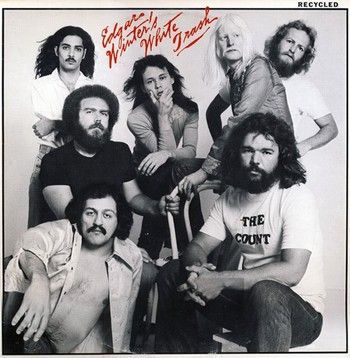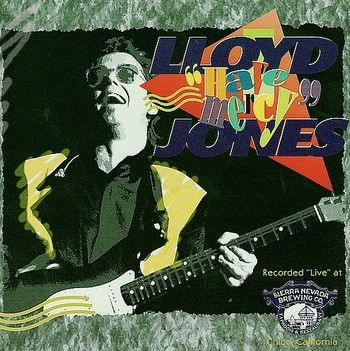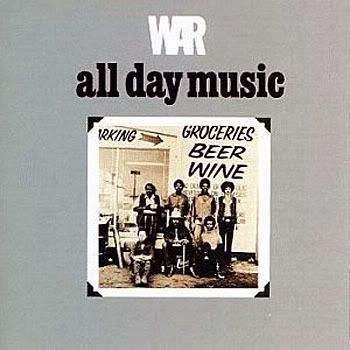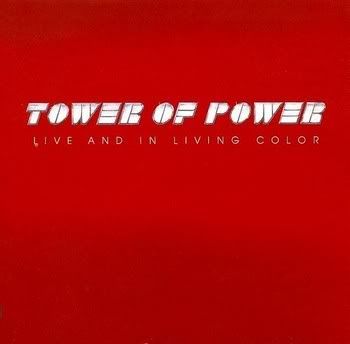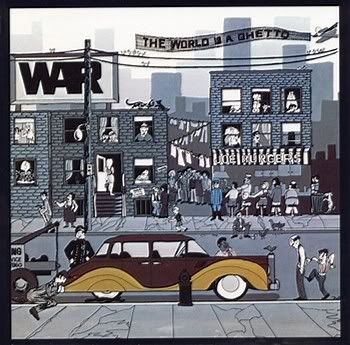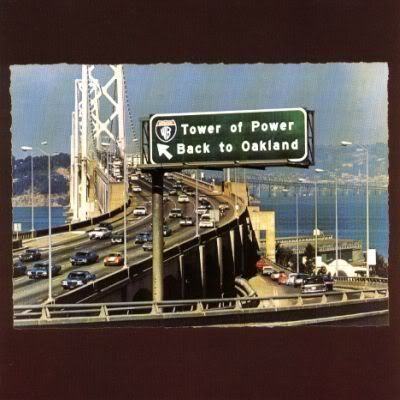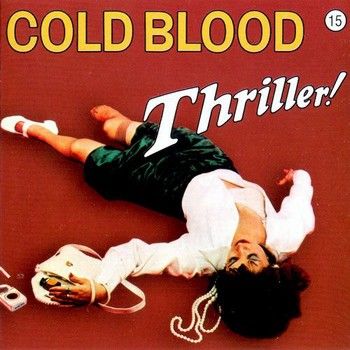
Cold Blood - Thriller - 1973 - Reprise
A San Francisco-based R&B band originally formed by guitarist Larry Field as the "New Invaders" in the wake of the Summer of Love, Cold Blood had the key elements of strong female vocalist, a fine guitarist, and a powerful horn section. After successful gigs at Golden Gate Park and at the Fillmore, they were signed by impresario Bill Graham to his new San Francisco Records label, on which they released their self-titled debut in 1969. Four more albums followed over the next five years -- in fact, later efforts boasted the production and musical contributions of Steve Cropper -- but all were hamstrung by Graham's underhanded distribution deals with Columbia and Atlantic. Lydia Though the debut's single "You've Got Me Humming" crawled up to number 52 on the American charts, Cold Blood seemed doomed to labor in the shadow of bands like Tower of Power, Chicago, and especially Janis Joplin. The latter comparison became endemic among critics; for although blues belter joined Field's band as its youngest member -- she had formerly been, of all things, a childhood national rollerskating champion -- her magnetic stage presence established her as the band's central force. Eventually, the band billed itself as Lydia Pense With Cold Blood, and even released an album simply titled Lydia. Joplin sensed a kindred soul; after screaming at Cold Blood for scooping her on a blistering cover of "Piece of My Heart," she warmed to Pense enough to give her a swig of Southern Comfort. After hitting increasingly lower tier venues in San Francisco by the late '70s, Cold Blood disbanded for most of the next decade; Pense focused her energies on child rearing. By the late '80s, the band slowly awoke from its long sleep, and they began regular features on California's festival and fair circuit. A 1998 return to their Fillmore stomping ground brought out the band's faithful. © Paul Collins © 2013 AllMusic, a division of All Media Network, LLC. | All Rights Reserved http://www.allmusic.com/artist/cold-blood-mn0000774807/biography
Thriller! -- Cold Blood's fourth LP -- is a continuation on the brass-intensive funky R&B that drove their previous efforts. In contrast to those discs, however, there is very little in the way of original material here, the singular exception being Max Haskett's rollicking "Live Your Dream," which features the Pointer Sisters on backing vocals. This was not the first collaborative effort between the two either, as the vocal trio had also made a few notable contributions to the Sisyphus album. One of the primary distinctions between Cold Blood and their Bay Area contemporaries the Tower of Power is lead vocalist Lydia Pense. She has developed from simply belting out the blues -- à la Janis Joplin -- to becoming an increasingly sensitive lyrical interpreter without diminishing her prowess or guttural growl. One prime example is her ease and agility on the cover of Stevie Wonder's "You Are the Sunshine of My Life" -- which likewise includes some of the finest and most tasteful contributions from the horn section. The same can also be said of their cover of the Band's "Sleeping" -- retaining much of the same charm as the original. Cold Blood contrasts the mellow with a few loud funkified fusion numbers, such as the lead track, "Baby I Love You," and "Kissing My Love" -- which hearkens directly back to the double-jointed rhythms found in the band's eponymously titled debut album. Another highlight is Raul Matute's Hammond-organ on the classic blues "Feel So Bad" -- which is similar to Ray Charles' original reading. © Lindsay Planer © 2013 AllMusic, a division of All Media Network, LLC. | All Rights Reserved http://www.allmusic.com/album/thriller!-mw0000670637
Brilliant funkified soul, blues and R&B from the great Lydia Pense & Cold Blood. The present awful music scene needs a good injection of music like this. Because of trash music fed to people by various TV channels and TV shows like “Britain/America’s Got Talent”, “The X Factor”, and more, many people have never heard this kind of music and the fat cats who own the major media outlets will make sure they never will. Did you ever listen to the so called “judges” on these shows? They know how to make big bucks, but as regards quality music, most of them wouldn’t know the difference between a good artist and a hole in the ground. It's amazing just how many great artists are out there who seldom if ever receive any radio play. It's paradoxical, because usually to get heard on the media, you have to sell out to the commercial, money-driven fat cats in the music industry. You can also retain your musical integrity and never get heard! That's why I originally set up a music blog...to try and bring these artists to a bigger audience. In my own small way, I hope I am helping to promote the lesser known artists. I receive many e-mails and comments from people who are completely oblivious to this kind of music and are very interested in checking out these musicians. Many people will say that uploading music is wrong and depriving artists of their income, etc. I would say that without bloggers and other less commercial outlets, many artists would have an even smaller income as many real music lovers would be unaware of their existence! Always a hot subject! Listen to Lydia Pense & Cold Blood’s great “Transfusion” album. Support real music! [All tracks @ 320 Kbps: File size = 95 Mb]
TRACKS / COMPOSERS
1 Baby I Love You - Jerry Ragavoy 6:10
2 You Are The Sunshine Of My Life - Stevie Wonder 7:40
3 Feel So Bad - L.Temple & L.Johnson 7:22
4 Sleeping - Robbie Robertson & Richard Manuel 5:16
5 Live Your Dream - Max Haskett 3:21
6 I'll Be Long Gone - Boz Scaggs 5:40
7 Kissing My Love - Bill Withers 6:07
MUSICIANS
Lydia Pense - Lead Vocals
Michael Sasaki - Electric & Acoustic Guitar
Rod Ellicott - Bass
Raul Matute - Keyboards
Gaylord Birch - Drums
Bob Ferreira - Tenor Saxophone, Flute
Bennie Maupin - Tenor Saxophone, Bass Clarinet
Skip Mesquite - Tenor Saxophone, Flute, Backing Vocals
Mel Martin - Baritone Saxophone, Tenor Saxophone, Flute
Michael Andreas - Saxophone
Rigby Powell - Trumpet
Peter Welker - Trumpet, Flugelhorn
Bill Atwood - Trumpet, Flute, Flugelhorn
Max Haskett - Trumpet, Background Vocals
John Mewborn - Trumpet, Trombone (Valve)
Pat O'Hara - Trombone
The Pointer Sisters, Holly Tigard - Background Vocals
BIO (WIKI)
Cold Blood is a long-standing soul-rock-jazz band founded by Larry Field in 1968 and originally based in the San Francisco East Bay area. They have also performed and recorded under the name "Lydia Pense and Cold Blood", due to the popularity of their lead singer, Lydia Pense. The band first came to prominence in 1969 when rock impresario Bill Graham signed them after an audition and they played the Fillmore West in San Francisco. Pense has been compared to Janis Joplin, and it was Joplin who recommended the audition to Graham. The band has often been compared to another long-standing popular Northern California group, Tower of Power, and like Tower of Power they were rare in that they featured a horn section in addition to guitar, keyboards (usually featuring a Hammond organ and Leslie speaker), bass and drums. The Tower of Power horn players have performed with Cold Blood on a regular basis since the early 1970s. Skip Mesquite and Mic Gillette have been members of both Tower Of Power and Cold Blood. Their fan base also overlaps with the Sons of Champlin, although their musical styles are quite different. Their initial four albums, Cold Blood (produced by David Rubinson), Sisyphus (produced by Fred Catero), First Taste of Sin (produced by Donny Hathaway), and Thriller (produced by David Rubinson) remain their best known work. The band disbanded in the late 1970s, reformed in the 1980s and stabilized with its current membership in the 1990s. Cold Blood continues to record and perform today, and some former band members such as Raul Matute (and some from Tower of Power) appear on the band's most recent album. Original band members were founder Larry Field (lead guitar), Lydia Pense (vocals), Danny Hull (tenor saxophone and songwriter), Larry Jonutz (trumpet; born Mar 15 1947), Pat O'Hara (trombone; born May 25, 1946 (?), died August 1977 of an overdose), Raul Matute (Hammond organ, piano, arranger and songwriter, born Feb 19 1946), Jerry Jonutz (baritone, alto and tenor saxophone; born Mar 15 1947), David Padron (trumpet; born May 4 1946), Rod Ellicott (bass), Paul C Saenz (guitar), and Frank Davis, who was replaced on drums by Sandy McKee (real name Cecil James Stoltie, born 12 July 1945, died 15 October 1995) during the Sisyphus sessions. Narada Michael Walden and Jonathan "Sugarfoot" Moffett both mention McKee on their short list of drummers most influential in their stylistic development. Over the years there have been various incarnations of the band including singer/trumpet player Max Haskett (born 7 March 1947, died 15 September 1999, ex-Rubicon), Tower Of Power horn player Mic Gillette, Journey keyboardist Stevie "Keys" Roseman on Hammond B-3 organ, Sons Of Champlin drummer Jim Preston, guitar player Michael Sasaki (born Apr 3 1952), Tower Of Power guitarist Jeff Tamelier, Boz Scaggs horn player Tom Poole, Elvin Bishop sax player Bill Slais, bass player Michael White & others. Current personnel are Lydia Pense (vocals), Steve Salinas (keyboards), Steve Dunne (guitar), Mike Morgan (percussion), Evan Palmerston (bass), Rich Armstrong (trumpet, percussion), Rob Zuckerman (alto, tenor, baritone saxes) and Donny Baldwin (drums). Cold Blood is featured playing live in Fillmore, a documentary of the last concerts at the Fillmore West auditorium during July 1971.
ABOUT LYDIA PENSE
Lydia Pense (born Lydia Jane Pense in San Francisco, California on December 14, 1947) is an American rock-soul-jazz singer who since 1969 has performed with the band Cold Blood. Her style has been compared to powerful singers including Janis Joplin (who recommended the band to Bill Graham for their first audition), Aretha Franklin and Teena Marie. Pense's mother, the former Miss Ramos, was born in Madrid, Spain, while her father came from Nebraska, United States. While attending Sequoia High School in Redwood City, California at the age of 14, Pense started singing with a band called The Dimensions, with Guitarist Fred Tatman. She was a fan of Brenda Lee and was singing her songs, but the band, formed by Fred Tatman, Larry Hatch, Paul C Saenz, and Kerry Yates encouraged her to sing R&B in the style of James Brown, Chuck Berry, Fats Domino, and Ray Charles. Lydia joined Cold Blood in 1968. Their initial four albums, Cold Blood, Sisyphus, First Taste of Sin (produced by Donny Hathaway), and Thriller remain their best known work. The band continues to record and perform today. The band separated in the late 1970s, and Pense suspended her career in the 1980s to raise her daughter before re-forming the group. – from Wikipedia


